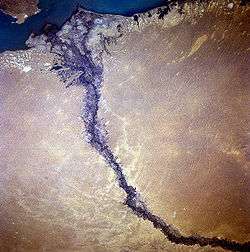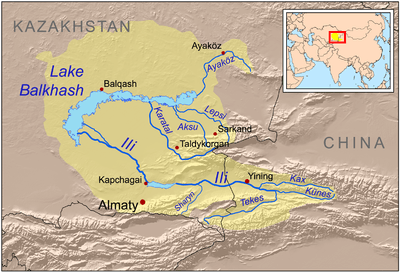Karatal River
The Karatal River (Russian: Каратал, Karatal; Khalkha Mongolian: Хартал Hartal, "Black Steppe"), also known as the Qaratal River (Kazakh: Қаратал, Qaratal), is a river in Kazakhstan that originates in the Dzungarian Alatau Mountains near the border of with China and flows into Lake Balkhash. It is the easternmost of two large rivers that flow into the lake; the other is the Ili River.[1] The Karatal is one of the main rivers of the historic region of Zhetysu.
| Karatal River | |
|---|---|
 Satellite image of Karatal River delta as it enters Lake Balkhash, September 1996. The darker areas within the river valley floodplain are areas of irrigation. | |
 Map of the Lake Balkhash drainage basin | |
| Location | |
| Country | Kazakhstan |
| Physical characteristics | |
| Source | |
| • location | Dzungarsk-Alatau Mountains |
| Mouth | |
• location | Lake Balkhash |
| Length | 390 km (240 mi) |
| Basin size | 19,100 km2 (7,400 sq mi) |
The river flows west-south-west from the border with China before turning north-westward south of Taldykorgan and then northward when it reaches the Saryesik-Atyrau Desert, a large sand desert south of Lake Balkhash. The river empties into Lake Balkhash near the centerpoint of its southern side. Karatal freezes up in December and stays icebound until March. Because of irrigation, the river's flow into Lake Balkash is limited.[1]
Description
The Karatal river is the second largest river after the Ili river in the territory of Semirechye. Translated from the Kazakh language, the river is translated as "Black willow".
Fauna
From the West, the multi-water Koksu river flows into the Karatal river. The river is home to pelicans, ducks, several species of ducks, herons , and others.
References
- STS-79 Shuttle Mission Imagery (STS079-781-100) NASA
External links
- Great Soviet Encyclopedia
- National Aeronautics and Space Administration